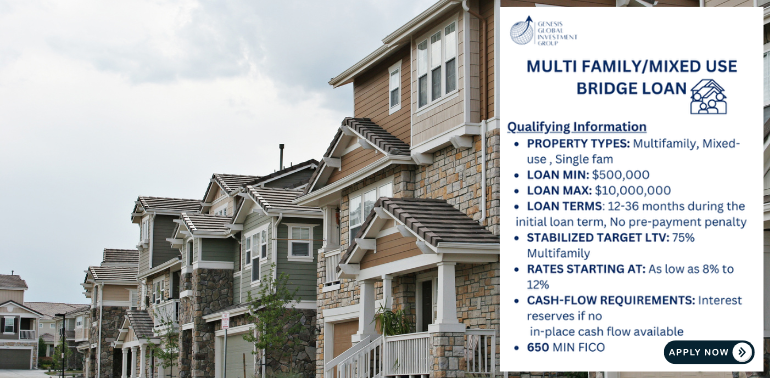Multi-Family Mixed Use Loan
A Multi-Family Mixed-Use Loan is a type of commercial loan designed for properties that combine residential and commercial spaces. These properties typically feature both multi-family residential units (such as apartments) and commercial spaces (such as retail shops, offices, or restaurants) in the same building or complex.
Lenders classify mixed-use properties as commercial real estate if more than 25% of the property is designated for commercial use. If the residential portion exceeds this threshold, it may be eligible for traditional residential financing.
Typical Uses of Multi-Family Mixed-Use Loans
- Purchasing a building with both apartments and retail or office space.
- Refinancing an existing multi-family mixed-use property.
- Renovating or redeveloping a mixed-use property.
- Construction financing for new multi-family mixed-use developments.
Considerations Before Choosing a Multi-Family Mixed-Use Loan
Selecting the right financing for a multi-family mixed-use property requires careful evaluation of various factors to ensure profitability and long-term success. Below are key considerations before applying for a loan:
1. Property Type and Zoning Laws
- Zoning Regulations: Ensure the property is correctly zoned for both residential and commercial use. Mixed-use zoning laws vary by city and can impact financing options.
- Property Classification: Some properties may be classified as residential if the commercial space is less than 25%, making them eligible for different loan types.
- Future Use Flexibility: If you plan to modify the property’s use, confirm that the zoning allows for potential conversions.
2. Loan Type & Financing Structure
Different loan types come with unique benefits and limitations:
- Traditional Commercial Loans (best for stabilized properties).
- Bridge Loans (short-term financing for acquisitions, renovations, or repositioning).
- SBA 504/7(a) Loans (ideal for owner-occupied properties).
- Hard Money Loans (for quick financing with less stringent credit requirements).
- CMBS or Private Equity Loans (for large-scale investments).
Understanding the terms, amortization, and repayment schedule will help align the loan structure with your investment goals.
3. Loan-to-Value (LTV) and Down Payment Requirements
- LTV Ratio: Lenders typically offer 65% to 80% LTV, meaning borrowers need 20% to 35% as a down payment.
- Equity Requirements: Some lenders may require a minimum level of borrower equity, especially for high-value deals.
Ensure you have enough capital to cover the down payment, closing costs, and reserves.
4. Debt Service Coverage Ratio (DSCR) and Cash Flow Considerations
- DSCR Requirement: Most lenders require a DSCR of 1.20 to 1.40, meaning the property’s net income must cover 120% to 140% of the debt obligations.
- Rental Income Stability: A stable rental history and long-term lease agreements improve financing terms.
- Vacancy Risk: If a significant portion of the income comes from commercial tenants, ensure the business sector is stable.
Lenders may hesitate to finance properties with high vacancy rates or unstable tenants.
5. Interest Rates and Loan Terms
- Fixed vs. Variable Interest Rates: Fixed rates provide stability, while adjustable rates may offer lower initial costs but increase risk.
- Amortization Period: Loans typically range from 20 to 30 years but may be shorter for bridge loans.
- Prepayment Penalties: Some lenders charge penalties for early loan repayment, which can affect refinancing strategies.
Compare different lenders to find the best interest rates and loan terms for your needs.
6. Credit Score and Financial Strength
- Credit Score: Most commercial lenders require a minimum credit score of 650, with better rates for 700+.
- Personal & Business Financials: Tax returns, bank statements, and profit/loss statements will be scrutinized.
- Reserves & Liquidity: Lenders may require proof of 6-12 months of mortgage reserves to cover potential shortfalls.
If your credit score is low, consider hard money lenders or forming partnerships with financially stronger investors.
7. Property Location and Market Demand
- High-Demand Areas: Mixed-use properties in urban centers, college towns, and transit hubs are more attractive to lenders.
- Economic Trends: Look for areas with growing population, business development, and strong rental demand.
- Commercial Tenant Viability: If the commercial space relies on retail, consider the impact of market trends and e-commerce shifts.
Lenders assess location risk, so a strong market with high occupancy rates improves approval odds.
8. Future Growth and Exit Strategy
- Long-Term Investment Goals: Are you holding for long-term cash flow or planning to sell or refinance within a few years?
- Refinancing Options: Ensure the loan terms allow for favorable refinancing if rates drop.
- Resale Value: Choose properties with strong appreciation potential and versatile use cases to appeal to future buyers.
A well-planned exit strategy protects against unforeseen market changes.
9. Lender Experience & Loan Process
- Choose Lenders Familiar with Mixed-Use Financing: Some lenders specialize in multi-family mixed-use properties and offer better terms.
- Loan Approval Timeline: Traditional loans can take 30-60 days, while bridge or hard money loans close in 7-21 days.
- Loan Fees & Closing Costs: Expect 2-5% of the loan amount in origination fees, appraisal costs, and legal fees.
Working with an experienced lender or commercial mortgage broker streamlines the approval process.
10. Regulatory & Compliance Requirements
- Environmental Assessments: Some lenders require Phase I or Phase II environmental reports if the property has a history of industrial use.
- Lease Agreements: Lenders review commercial and residential leases to assess cash flow reliability.
- Building Code Compliance: Ensure the property meets fire, safety, and ADA regulations to avoid costly fines or financing delays.
Failing to meet compliance standards can derail financing and lead to legal issues.
- Dedicated Client Support
- Competitive Rates & Terms
- Tailored Financial Solutions
- Fast & Easy Application Process
- Access to a Broad Lender Network
- Financial Expertise You Can Trust

We specialize in Multi-Family and Mixed Use Loan financing across all 49 states. Our competitive rates, flexible terms, and quick approval process are designed to help you succeed. Whether you’re a seasoned investor or new to the market, we’ll work with you to structure a loan that fits your project’s unique requirements.
Contact Us Today Ready to fund your next Bridge Loan? Reach out to Genesis Global Investment Group for expert guidance and fast funding. We’re here to help you maximize your investment potential! Apply Now
Multi-Family Mixed Use Loan FAQ's
What are Eligibility Factors Considered by Lenders?
-Borrower’s creditworthiness and financial stability.
-Property cash flow and occupancy rates.
-Market demand for mixed-use spaces in the location.
-Borrower experience in property management or real estate investment.
What qualifies as a multi-family mixed-use property?
A property qualifies as multi-family mixed-use if it includes both residential and commercial components. Examples include:
-Apartment buildings with ground-floor retail stores.
-Mixed-use developments with office space and rental units.
-Residential buildings with medical offices or restaurants.
Can I get a traditional residential mortgage for a mixed-use property?
No, unless the commercial portion is very small (typically less than 25% of the total square footage). If the commercial space is significant, you will need a commercial loan.
What are the key benefits of multi-family mixed-use loans?
-Diversified income streams from residential and commercial tenants.
-Higher property value appreciation due to mixed-use demand.
-Potential tax benefits through depreciation and write-offs.
What is the difference between a multi-family mixed-use loan and an apartment loan?
A multi-family loan is strictly for residential rental properties (5+ units). A mixed-use loan is for properties that combine residential and commercial uses.
Are interest rates higher for mixed-use loans?
Yes, mixed-use loans often have slightly higher rates than standard multi-family loans due to the additional risk associated with commercial tenants.
Do I need a higher down payment for a mixed-use loan?
Yes, down payments typically range from 20% to 35%.
Can I use rental income to qualify for the loan?
Yes, lenders consider both residential and commercial rental income when assessing your debt service coverage ratio (DSCR).
What is a good DSCR for mixed-use properties?
Most lenders require a DSCR of at least 1.25 (meaning the property generates 25% more income than its debt obligations).
Can I refinance a multi-family mixed-use property?
Yes, you can refinance to:
-Secure a lower interest rate.
-Pull cash out for renovations.
-Switch from a bridge loan to permanent financing.
How fast can I close on a mixed-use loan?
-Traditional loans: 30-60 days (banks, SBA loans).
-Bridge or hard money loans: 7-21 days (faster, but higher rates).
What documents do I need to apply?
Typical requirements include:
-Property financials (rent roll, income statements).
-Tax returns (personal & business, last 2 years).
-Bank statements (last 3-6 months).
-Credit report.
-Property appraisal and business leases (if applicable).
What happens if I default on my mixed-use loan?
If you default, the lender may:
-Foreclose on the property.
-Sell the loan to investors.
-Require a personal guarantee to cover losses (if applicable).
Are there special programs for owner-occupied mixed-use properties?
Yes! SBA 504 and 7(a) loans offer low down payments (10-15%) and long terms if at least 51% of the space is owner-occupied.
What is the interest rate on a loan?
Bring to the table win-win survival strategies to ensure proactive domination. At the end of the day, going forward, a new normal that has evolved from generation X is on the
%
Rates as low as 8% to 12%
$ K
Loans from $500K to $10M+
%
Up to 85% for Purchase and Rate & Term Refinances, Up to 75% for Cash Out Refinances
MTHS
Typically 12-36 months during the initial loan term, No pre-payment penalty
GGIG Commercial Loan Mortgage Calculator
Your Results:
Save results:
| Period | Date Payment | Opening Balance | Monthly Principal | Monthly Interest | Closing Balance |
|---|


